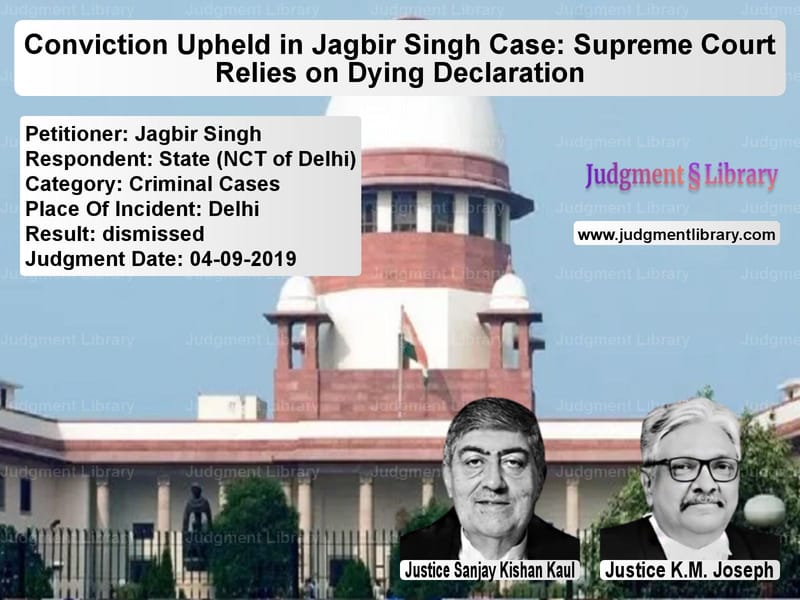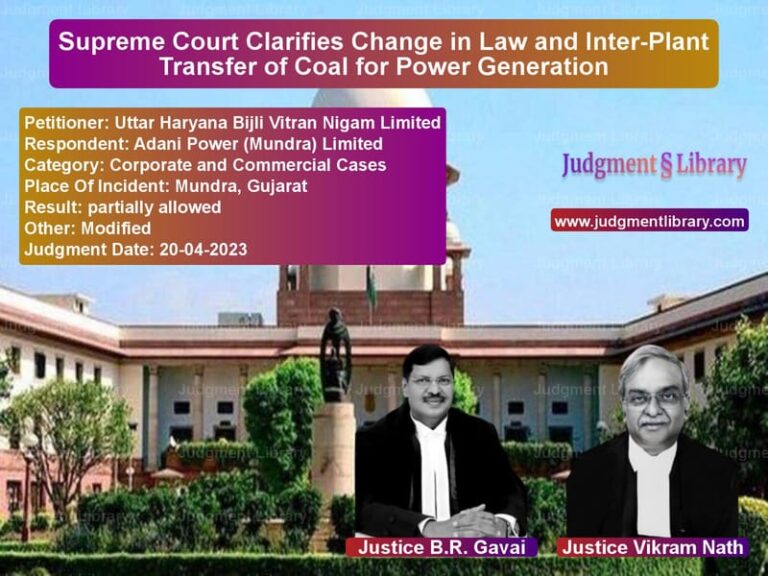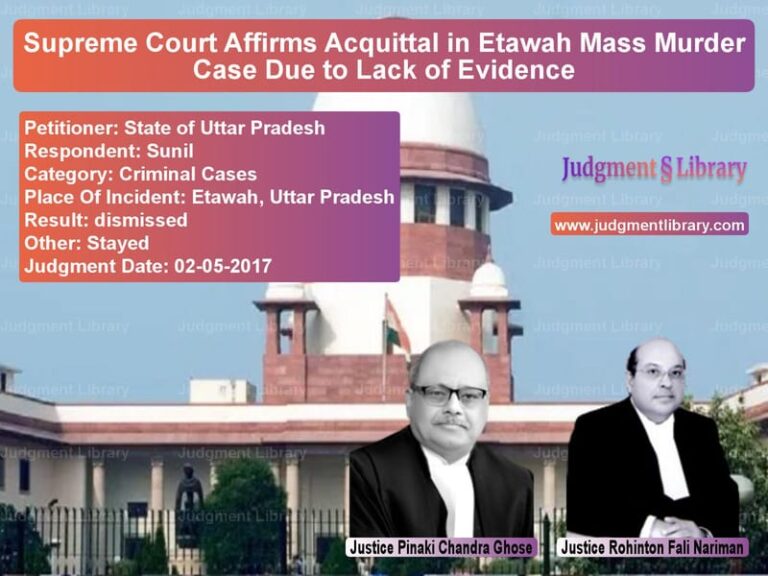Conviction Upheld in Jagbir Singh Case: Supreme Court Relies on Dying Declaration
The case of Jagbir Singh vs. State (NCT of Delhi) revolves around the conviction of the appellant under Sections 302 and 506 of the Indian Penal Code (IPC) for the murder of his wife. The Supreme Court, in its judgment on September 4, 2019, upheld the conviction, relying heavily on the deceased’s dying declaration as credible evidence.
Background of the Case
The appellant, Jagbir Singh, was married to the deceased in 1999. Initially unemployed, he later secured a job with the Central Reserve Police Force (CRPF). Despite being married, he maintained an illicit relationship with his sister-in-law (his brother’s wife). The prosecution alleged that he frequently harassed his wife and subjected her to cruelty. In 2008, an argument between the couple escalated into violence, leading to the wife being set on fire.
On January 24, 2008, at about 6:00 PM, the appellant, in an inebriated state, poured kerosene oil over his wife and himself before setting her ablaze. Initially, she did not implicate him, but on January 27, 2008, she provided a dying declaration, directly blaming her husband for the act.
Legal Issues and Arguments
Arguments by the Prosecution:
- The deceased’s dying declaration explicitly held the appellant responsible for pouring kerosene and setting her on fire.
- Forensic evidence confirmed the presence of kerosene residue on the deceased’s clothes and at the crime scene.
- The appellant had a history of cruelty and an extramarital affair, which served as the motive.
- Statements from the deceased’s relatives and neighbors corroborated the prosecution’s case.
Arguments by the Defense:
- The deceased initially did not implicate the appellant and stated that the fire was accidental.
- Her later dying declaration was a result of tutoring and manipulation by her family.
- The appellant also suffered burn injuries, indicating that he attempted to save his wife.
- The prosecution failed to obtain a medical fitness certificate before recording the dying declaration.
Supreme Court’s Observations
The Supreme Court examined the reliability of multiple dying declarations. The first declaration, recorded on January 24, 2008, stated that the fire erupted accidentally when the appellant was lighting a matchstick near a leaking motorcycle. However, in her final statement on January 27, 2008, the deceased explicitly accused her husband of setting her on fire.
The Court emphasized:
“Where there are multiple dying declarations, the Court must carefully analyze the circumstances surrounding each declaration to determine its credibility.”
The Court further ruled:
“The dying declaration dated January 27, 2008, is consistent, voluntary, and reliable. There is no evidence of undue influence or tutoring.”
Key Rulings and Sentencing
The Supreme Court upheld the Trial Court and High Court’s findings, affirming the appellant’s conviction under:
- Section 302 IPC (Murder) – Life imprisonment.
- Section 506 IPC (Criminal Intimidation) – Rigorous imprisonment for two years.
The sentences were ordered to run concurrently, and the appellant’s bail was canceled.
Conclusion
The Supreme Court’s judgment reaffirmed the evidentiary value of a dying declaration, provided it is free from coercion or manipulation. The case highlights the importance of analyzing multiple dying declarations and corroborative forensic evidence in securing a conviction.
Petitioner Name: Jagbir Singh.Respondent Name: State (NCT of Delhi).Judgment By: Justice Sanjay Kishan Kaul, Justice K.M. Joseph.Place Of Incident: Delhi.Judgment Date: 04-09-2019.
Don’t miss out on the full details! Download the complete judgment in PDF format below and gain valuable insights instantly!
Download Judgment: Jagbir Singh vs State (NCT of Delhi) Supreme Court of India Judgment Dated 04-09-2019.pdf
Direct Downlaod Judgment: Direct downlaod this Judgment
See all petitions in Murder Cases
See all petitions in Attempt to Murder Cases
See all petitions in Judgment by Sanjay Kishan Kaul
See all petitions in Judgment by K.M. Joseph
See all petitions in dismissed
See all petitions in supreme court of India judgments September 2019
See all petitions in 2019 judgments
See all posts in Criminal Cases Category
See all allowed petitions in Criminal Cases Category
See all Dismissed petitions in Criminal Cases Category
See all partially allowed petitions in Criminal Cases Category







